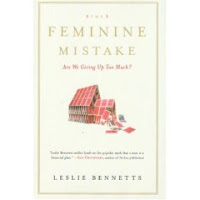So I’m doing research for some magazine articles I’m writing about cutting-edge couples in a (supposed) new era of equality and came across the following:
Based on a study of 120 in-depth interviews with young adults conducted between 1998-2003, NYU sociologist Kathleen Gerson reports that 3/4 of women said they plan to build a non-negotiable base of self-reliance and an independent identity in the world of paid work.
And according to other studies, there are fewer households with highly unequal divisions of family labor and more households with equal divisions than ever before — both in the US and across Europe. Turns out, if egalitarian divisions aren’t possible, what a husband wants and what a wife wants are often at odds. According to Gerson, “If a supportive, equal partnership is not possible, most women prefer individual autonomy over becoming dependent on a husband in a traditional marriage. Most men, however, if they can’t have an equal balance between work and parenting, fall back on a neo-traditional arrangement that allows them to put their own work prospects first and rely on a partner for most caregiving.”
So, um, what might this say about who’s really calling shots in those couples featured by Leslie Bennetts where the wives are staying home? Just a thought…
(All info drawn from the special Council on Contemporary Families issue of The American Prospect last month)


